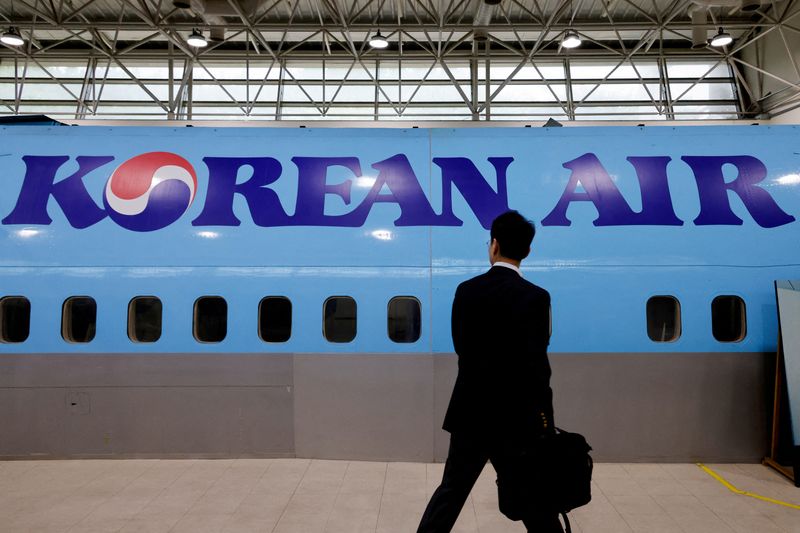By Lisa Barrington
SEOUL (Reuters) – South Korea will support smaller airlines and monitor competitiveness in the market after dominant carrier Korean Air completed a $1.3 billion takeover of Asiana Airlines on Thursday to become one of the nation’s largest airlines. to create Asia. Korean Air acquired a 63.88% stake in the country’s second-largest airline, making it a subsidiary three years later than Asiana had initially expected. The expanded Korean Air group could account for just over half of South Korea’s passenger capacity and become the world’s 12th largest airline by international capacity, a Reuters analysis of aviation data from Cirium and OAG shows .
According to its 2023 financial results, it would be one of the largest by revenue in the Asia-Pacific region alongside China’s top three state-owned enterprises.
South Korea’s Transport Ministry on Wednesday unveiled measures to boost competitiveness in the domestic aviation industry, such as additional medium- and long-haul traffic rights for low-cost airlines, according to Yonhap news agency.
By March, the Fair Trade Commission (FTC) plans to set up a panel to monitor Korean Air’s compliance with the conditions attached to the approval of the merger, which was finalized on Wednesday.
The conditions include a pledge by Korean Air not to drop the number of seats on major routes below 90% of 2019 levels, an FTC document showed.
Korean Air said there would be no staff layoffs.
“The combined organization expects to see natural workforce growth through business expansion, with employees being reassigned to overlapping roles within the organization,” the company said in a statement.
The takeover was hampered by competitive concerns. Korean Air had to make significant concessions around the world, including transferring routes to other airlines and selling off Asiana’s cargo operations, to complete the deal.
It is the longest airline merger ever completed and was first announced in November 2020 to rescue debt-laden Asiana, which has suffered a drop in demand during the COVID-19 pandemic.
Asiana will be run as a subsidiary for up to two years before being integrated into a single airline that will keep the Korean Air name but with a new brand name.
Korean Air will also create a single low-cost airline and its integration strategy includes spreading flight schedules on overlapping routes, adding new destinations and increasing safety investments, the company said.
A plan to merge the two airlines’ frequent flyer programs will be submitted to the FTC for review by June 2025, Korean Air said, adding that the merger would strengthen its competitive position globally.
The airline said the deal aims to boost the capabilities and network reach of Incheon International Airport, the world’s fourth busiest for international flights and fifth busiest for cargo, which competes with Asian hubs Hong Kong and Singapore.

Airline consolidation is rarer in Asia than in Europe, where there has been a wave of mergers over the past two decades, and in North America, where regulators fear the industry is too concentrated.
Asiana will hold an extraordinary general meeting of shareholders on January 16 to appoint new board members nominated by Korean Air.


